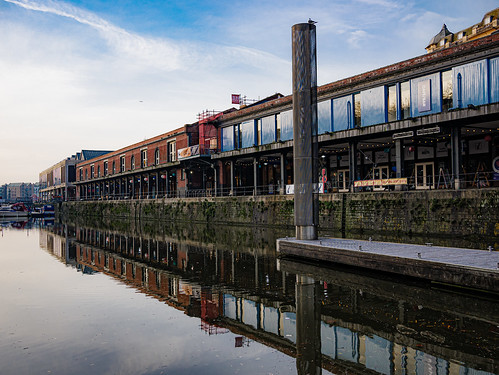Another shot from the same walk. This time I have boosted the saturation a bit.
From the category archives:
Academia
This piece is a guest-post from Major Richard Streatfeild (retd)
Rifleman Jamie Davis served with A Company 4Rifles in Iraq in 2007 and Afghanistan and 2009/10. In Afghanistan he lived for 5 months in a small patrol base with his platoon and members of the Afghan Army; initially under constant attack and thereafter never far from the threat of rockets, grenades or roadside bombs. He was, I think, the last Rifleman in A Company to be injured in Afghanistan, taking frag from a ricochet in the leg. Jamie was made for the front row of the scrum, and I suspect it was where he was most at home, both in stature and character. He was never the fastest mover, but he kept going, until now.
Jamie was at the point of the tip of the spear in Afghanistan in 2010; treating wounded children, witness and aid to his comrades rendered both limbless and lifeless, and in one case being on the casualty evacuation of his own section commander. I remember him as stalwart of his platoon, the Battalion Rugby team and
On the weekend of 12 Jan 2020, Jamie took his own life. Ten years on I hope I can still just about speak for the company he served in. We still recognise and appreciate the fortitude and good humour with which Jamie faced the dangers of operations and the value of his service. We mourn his passing and remember that he was once amongst the bravest of the brave – once a true British Lion.
Jamie is now the fourth “Rifleman” from A Company from my two years in command ten years ago to have died at home, not abroad, in similar tragic circumstances. Almost as many as we lost there, a figure that is fast becoming a stain on post operational care. Our regiment, the army, the NHS, and our government; all seemingly at a loss to identify those at risk, treat them and ultimately to prevent these deaths. The limits of helplines; of instructions to ‘reach out’; of “ten tips to top mental health” have been cruelly exposed, once again. The system; and by that I mean the army – for those still serving – the department for Veterans affairs for those who have left, must dedicate time and manpower to find those who have been exposed to trauma, screen everyone on a routine basis and treat those who need it. Suicide has become when, not if. Not only could it happen to anyone, it will happen to someone. Jamie’s death is a tragedy amid a scandal.
Today, I joined three colleagues to head to The Hague to hand over a report of 720 formal complaints of structural overtime in academia and its negative consequences to the Labour Inspectorate. These complaints were filed as a single collective complaint by two labour unions, on behalf of WOinActie, the activist group of academics that tries to improve working and learning conditions in academia. The main claim of WOinActie has been that the Dutch Universities (which are all public), have become inadequately funded due to the rising number of students over the last two decades, and that this has caused structural overtime to be necessary to get the work done, which in turn harms the mental, physical and social well-being of university staff. And it’s also harming the quality of our teaching.
The report released today, which we translated in English (in order to inform and inspire the debate on overtime work in academia internationally), reveals the nature of the negative consequences. Colleagues report negative effects on their mental and physical health, sleep deprivation, constant worrying, deterioration of their friendships and other social relations, insufficient time for self-care including doing exercise, and so forth. The main problem is that the notional hours that are given to teach a course or do supervision (cfr. this post on PhD-supervision) are inadequate, and hence a 70% teaching load leads to a more-than-fulltime workload. And since everyone also wants to, needs to, and/or is expected to do research, that also still needs to be done. Add some administration and/or leadership tasks, and societal outreach, and we easily make 55 hours a week. For colleagues who only teach, and who are on the lowest pay scales, this also means they have troubles buying a house or starting a family, since those contracts are almost always part-time, and hence also create financial stress.
Some aspects of academia show great international variation. There is one on which I haven’t found any good data, and hence thought I’ll ask the crowd here so that we can gather our own data, even if it will be not very scientifically collected.
The question is this: if you are a university teacher/professor and your department awards PhD-degrees, do you get any official time allocated (or time-compensation) for PhD supervision? If it is part of a teaching load model, how many hours (or % teaching load) is it equivalent to? Or is there an expectation that you take on PhD-students but that this does not lead to a reduction in other tasks?
How do international practices of the conditions for PhD-supervisors compare? [click to continue…]
I’ve been working through David Estlund’s new book, Utopophobia [google books]. His work has changed my thinking in a lot of ways, mostly because I don’t usually think like him. So, when I realized I thought he was right about some things, it kind of spun me round. But in this post I’m going to talk about something else – another topic I’ve been mulling for years and meaning to turn into a paper at some point. The place of whimsy in thought-experiments.
As you know, my flesh is weak, so I’m on Twitter now. Today I meant just to riff on one funny, absurdist-tinged example from Estlund. But he’s got so many and I couldn’t help myself. It’s Lewd-and-Prude all over again, just like in the old days when there were blogs.
The issue is this: whimsy is – well, it’s not an emotion, I don’t suppose. It’s an attitude. More exactly, it’s a mode or manner of being detached. But it’s not a full, nor neutral style of detachment. It’s not the view from nowhere. It’s not action-oriented. But that doesn’t make it pan-observant or unfeeling. It’s perpetually tickled; it’s preferentially attendant to certain things, as opposed to others. (It knows you can’t just tickle yourself. Something else has to do it.)
The concern is that this makes it stupid, not to put too fine a point on it. [click to continue…]
In the wake of our disastrous election result, Geoff Robinson on twitter (@GeoffPolHist) linked to this piece I wrote in April 2013 and which I’d forgotten about. I see John Quiggin is recycling too, so that seems to be way of things round here today.
The 1970s have been in my mind over the past few days, not only for the obvious reason, but also because I visited the Glam exhibition at Tate Liverpool last weekend. Not only were the seventies the final decade of an electrical-chemical epoch that stretched back to the late nineteenth-century, they were also the time when the sexual and political experimentation of the 1960s and a sense of being part of a cosmopolitan world order became something for the masses, for the working class, and when the old social order started to dissolve. In the experience of many people, the sixties happened in the seventies, as it were.
But my main thoughts, concerning Britain at any rate, have been about social division, and about some oddly paradoxical features of British life before Thatcher. There’s a very real sense in which postwar British society was very sharply divided. On the one hand, it was possible to be born in an NHS hospital, to grow up on a council estate, to attend a state school, to work in a nationalised industry and, eventually (people hoped), to retire on a decent state pension, living entirely within a socialised system co-managed by the state and a powerful Labour movement. On the other, there were people who shared the experience of the NHS but with whom the commonality stopped there: they were privately educated, lived in an owner-occupied house and worked in the private sector. These were two alternate moral universes governed by their own sets of assumptions and inhabited by people with quite different outlooks. Both were powerful disciplinary orders. The working class society had one set of assumptions – welfarist, communitarian, but strongly gendered and somewhat intolerant of sexual “deviance”; middle-class society had another, expressed at public (that is, private) schools through institutions like compulsory Anglican chapel. Inside the private-sector world, at least, there was a powerful sense of resentment towards Labour, expressed in slogans about “managers right to manage” and so on that later found expression in some of the sadism of the Thatcher era towards the working-class communities that were being destroyed. Present too, at least in the more paranoid ramblings of those who contemplated coups against Labour, was the idea that that the parallel socialised order represented a kind of incipient Soviet alternative-in-waiting that might one day swallow them up.
[click to continue…]
Here’s a moving, brief, piece by Paul Cotterill about his dad, who flew over Germany in WWII, loved Eurovision, voted to stay in 1975, and died 40 years ago. It’s lovely.
And it reminded me that the old people in my life (none as old as Paul’s dad would have been, and none would be pleased to be designated old, but they’re older than me, and at this point that’s enough) all voted to stay, and I know that tomorrow they’ll all be voting to prevent a Tory government, and some have been working tirelessly to that end for weeks…well, decades, come to think of it.
One of the stranger terms of political abuse to enter the lexicon in recent years is “virtue signalling”. It’s used almost exclusively by the political right and covers many different kinds of statements, actions and policies, mostly associated with the culture wars.
A particularly striking feature of this is that, until recently, “virtue” was a term primarily associated with the right. Bill Bennett (Education Secretary under GW Bush) had a big hit with The Book of Virtues back in the 1990s. He’s now an apologist for Trumpism.
It’s too complicated to cover all aspects of this in one post, but it may be useful to compare two symbolic actions
- displaying a rainbow flag; and
- wearing a MAGA hat.
Clearly the term “virtue signalling” would be applied only to the first of these. And this is not just a matter of semantics, as it would be if the left had a corresponding term.
People who display the rainbow flag are virtue signalling in the obvious sense of the word: the flag says something like “equal marriage is a good cause. I support it, and so should you”.
Normally, the opposing response would be to say “No, it’s not a good cause, and those who support it are wrong’
The problem for the right is that they don’t have any moral standing for a claim like this, and they know it. While many rightwingers undoubtedly believe homosexuality to be sinful, they know that this belief violates norms of equal treatment and personal freedom they claim to accept, and they therefore can’t put it forward without inviting condemnation, or at least rejection, including from their own side. So, they have to resort to terms like “virtue signalling”, in this case implying an ostentatious moral superiority, combined with hypocrisy.
And the same is true across the whole range of issues summed up in the cognate term “Social Justice Warrior”.
The MAGA hat is the mirror image of this. The MAGA hat (unlike, say, an American flag lapel pin) is not a claim, legitimate or otherwise, to be a patriotic American. Rather, it’s a deliberately offensive statement of support for Trump’s racism, misogyny and corruption.
The whole point is to “trigger the libs” as Trump Jr’s recent book puts it. No claim to virtue is being put forward. It’s a pure piece of identity politics, making the assertion that the wearers should be treated as superior without having any actual justification for this claim, moral or otherwise. Again, this can’t be spelt out; being an explicit white nationalist remains beyond the pale, and the conduct of the Trumpists defies any credible defense.
So, the intellectual apologists of the right can only resort to <i>tu quoque</i>, making the claim, in various forms, that the left is just as bad as their own side. This started with the Republican War on Science, but is now virtually universal.
The point of ccusing other people of “virtue signalling” is to make this claim, without having to say what is wrong with the virtue being signalled.
Virtue signalling and hypocrisy
Most of the time, the accusation of “virtue signalling” includes an implicit connotation of “hypocrisy”. But then, why introduce a new and obscure term for something we have known about for millennia?
The answer is that hypocrisy is a specific accusation that can be backed up, or refuted, by evidence. For example, if a church leader who claims to be a Christian advocates locking up innocent children, the case is pretty clear-cut.
By contrast, “virtue signalling” is an insinuation rather than a factual claim. It doesn’t need to be backed up, and usually isn’t. If the person accused of virtue signalling on the basis of a symbolic action shows that they are in fact making costly efforts in support of their cause, these actions are just added to the charge sheet.
The charge of virtue signalling doesn’t rely on the actual inconsistencies of individuals. Rather it relies on in-group shared negative perceptions of out-groups (inner city latte sipping lefties and so on).
To restate the central point, accusations of virtue signalling aren’t meant to promote actual virtue over fraudulent signals: rather to argue against virtue and in favour of vice. Those who use the accusation want to score points in favor of behavior they aren’t willing to defend openly.
In all of this, it’s worth remembering the observation of La Rouchefoucald that “hypocrisy is the tribute vice pays to virtue”. The accusation of virtue signalling represents the refusal of vice to pay this tribute.
It’s been months since I posted! I’ve migrated to twitter. (The flesh is weak – but feel free to follow me!)
I’m going to try to start doing the sane thing. Long posts at CT, like God’s infinite mind intended. Short thoughts on Twitter, like humanity’s mayfly attention span tolerates.
Today I propose a new term in political theory. Vavilovian philosophical mimicry! [click to continue…]






